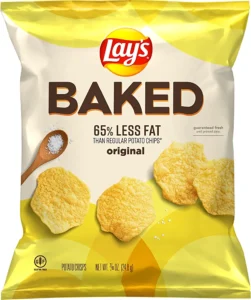Are Baked Chips Healthier than Fries?
Introduction
When it comes to snacking or enjoying a side dish with our meals, we often face the dilemma of choosing between baked chips and fries. Both options have their own appeal, but which one is healthier? In this article, we’ll explore the nutritional aspects of baked chips and fries, discussing their health benefits and potential concerns. By understanding their differences, you’ll be better equipped to make informed choices for your diet.
What are Baked Chips?

Baked chips are a type of snack made from thinly sliced potatoes or other vegetables. They are typically cooked in an oven using hot air circulation, eliminating the need for excessive oil. The process involves slicing the vegetables, seasoning them, and then baking them until they turn crispy.
Definition and Process
Baked chips are an alternative to traditional deep-fried chips. The absence of deep-frying reduces their fat content and makes them a healthier option for those who are conscious of their calorie intake. The baking process allows the chips to develop a satisfying crunch without excessive oil absorption.
Ingredients and Nutritional Value
Baked chips are often made with whole potatoes or vegetables, which provide essential nutrients such as dietary fiber, vitamins, and minerals. These chips are usually low in fat and calories compared to their fried counterparts. Additionally, they are often seasoned with herbs and spices to enhance their flavor.
What are Fries?
Fries, also known as French fries or chips in some regions, are a popular side dish made from potatoes. Fries are usually cooked by immersing them in hot oil until they turn a delightful golden color and achieve a satisfying crispiness. Fries come in various shapes and sizes, such as shoestring, steak, or curly fries.
Definition and Types
Fries are commonly made by cutting potatoes into long, thin strips and deep-frying them until they achieve a crispy texture. They can be seasoned with salt or other spices according to personal preference. In addition to potato fries, other vegetables like sweet potatoes or zucchini can also be used to make fries.
Ingredients and Nutritional Value
Fries are cooked by immersing the potato strips in hot oil, resulting in a higher fat content compared to baked chips. They are typically seasoned with salt or other flavorings. Potatoes, being a good source of dietary fiber and potassium, provide some nutritional value. However, the deep-frying process increases their calorie count and reduces the overall nutritional quality.
Health Benefits of Baked Chips
Baked chips offer several health benefits compared to traditional fried chips. These include:
Lower Fat Content
Since baked chips are prepared without deep-frying, they contain significantly less fat. This makes them a suitable choice for individuals aiming to reduce their fat intake or maintain a healthier lifestyle.
Fewer Calories
The baking process helps reduce the overall calorie count of chips, making them a better option for those watching their calorie intake. By cutting down on calories, baked chips can contribute to weight management and a healthier diet.
Reduced Acrylamide Formation
Acrylamide, a chemical compound that forms during high-temperature cooking processes like frying, has been associated with potential health risks. Baked chips, being cooked at lower temperatures, have reduced acrylamide formation compared to fried chips.
Health Concerns of Baked Chips
While baked chips offer certain advantages, it’s important to be aware of potential health concerns associated with them. These include:
High Sodium Content
Many commercially available baked chips can be high in sodium, which is a concern for individuals on low-sodium diets or those with hypertension. It’s crucial to check the nutrition labels and opt for brands with lower sodium content.
Artificial Additives
Some baked chip varieties may contain artificial additives, such as flavors, preservatives, or coloring agents. These additives can diminish the overall nutritional value of the chips. Choosing brands that use natural ingredients and minimal additives is advisable.
Health Benefits of Fries
Despite their reputation as a less healthy option, fries do offer some health benefits when consumed in moderation. These include:
Rich in Potassium
Potatoes, the main ingredient in fries, are a good source of potassium. This essential mineral plays a crucial role in maintaining healthy blood pressure levels and supporting various bodily functions.
Dietary Fiber
Potatoes, especially when consumed with the skin, provide dietary fiber, which aids digestion and promotes a feeling of fullness. However, this benefit can be outweighed by the negative effects of deep frying.
Source of Vitamins
Potatoes contain vitamins like vitamin C and B vitamins, which are essential for various bodily processes. However, the frying process can lead to some nutrient loss.
Health Concerns of Fries
While fries can offer certain nutritional benefits, they also come with health concerns, especially when consumed in excess. These concerns include:
High Fat Content
Deep-fried fries have a high fat content due to the oil absorption during the cooking process. Excessive consumption of fried foods can contribute to weight gain and increase the risk of cardiovascular diseases.
Increased Acrylamide Formation
As mentioned earlier, acrylamide forms during high-temperature cooking processes like deep frying. Fries, being deep-fried, are associated with higher acrylamide levels compared to baked chips.
Which Option is Healthier?
Determining which option is healthier, baked chips or fries, depends on various factors, including personal dietary goals, preferences, and overall lifestyle. If you’re looking to reduce fat and calorie intake, baked chips might be a better choice. However, if you’re seeking the nutritional benefits of potassium and dietary fiber, consuming fries in moderation can be considered.
Conclusion
In the battle between baked chips and fries, both options have their pros and cons. Baked chips offer lower fat content, fewer calories, and reduced acrylamide formation, making them a healthier alternative. On the other hand, fries provide potassium, dietary fiber, and certain vitamins, albeit with higher fat content and increased acrylamide levels. Ultimately, moderation and mindful consumption are key when incorporating these snacks into your diet.
